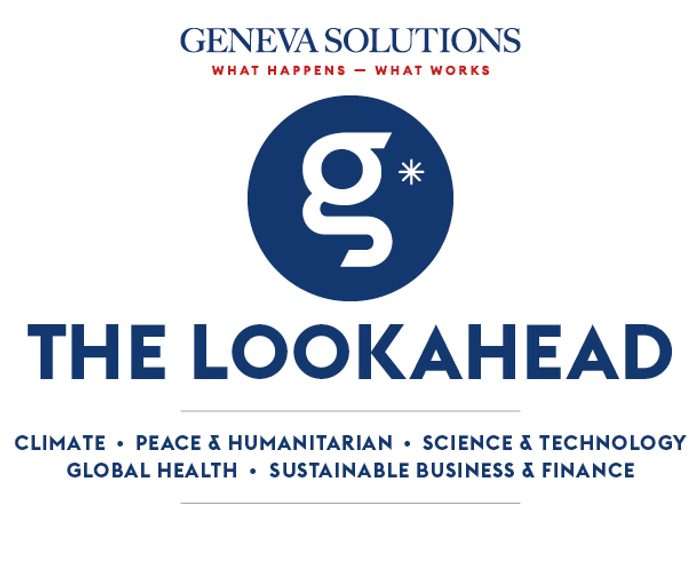Good morning, this is Kasmira. Cop may be finished but many countries and civil society actors are still feeling the sting after only a “paltry” sum of money was agreed on to help developing nations fight climate change.
This week, attention will turn to another city with the letter B – Busan, in South Korea – where the fifth and final round of talks to finalise a treaty on tackling plastic pollution will start today.
And in Geneva, a week dedicated to climate brings some provocative voices to the city, including historian Jean-Baptiste Fressoz, who questions the very notion of energy transition. |

|

Civil society organisations protesting on the final day of the COP29 climate conference in Baku, 23 November (Geneva Solutions/Paula Dupraz-Dobias)
|
|
FROM BAKU TO BELEM.
After two weeks of climate diplomacy which participants, including negotiators and civil society, described privately as “strange”, frustrations with the Azeri petrostrate presidency came to a boil as soon as the gavel came down Sunday morning on multiple decisions they felt they were not being heard on.
|
|
☹️ India's scathing review.
Chandni Raina, India’s head of delegation condemned the non-inclusivity of a statement they said they’d deliver in the final moments, accusing the presidency of ignoring them and “stage-managing” the adoption of a finance deal deemed unsatisfactory for developing countries. The $300bn a year rich countries promised to raise falls well short of the $1.3 trillion they were seeking to raise.
|
|
⛽Bulldozer effect.
Mohamed Adow, director of energy and climate at think tank Power Shift Africa tweeted: "Azerbaijan‘s authoritarian regime may be used to bulldozing opposition against its own people, but the UN process cannot be bullied in the same way.”
|
|
🪧Meanwhile, Alexandre Prado, green economy director at WWF Brazil, said that while expectations were high for more fruitful climate action at next year’s COP30 in Belém, the country will promise “lots of caipirinhas, music and lots and lots of marches”.
|
|
🧸Back to reality.
By Sunday morning, Baku felt like a real city once again, as crowds of people, including children and students who were given time off or provided with distance learning, reappeared on the streets. Merry-go rounds that could have been mistaken for monuments during the COP, were seen operating on the seaside promenade.
|
|
|
B for BUSAN.
Global efforts this week will now centre on another planetary emergency: plastic pollution. Nations will gather in the South Korean city of Busan for the fifth and final round of negotiations to craft a legally binding global treaty that has been more than two years in the making.
|
|
🥤Use. Throw away. Repeat.
Plastic production has sky-rocketed over the last 70 years. In 1950, the world produced just two million tonnes of the cheap and versatile material. It now produces over 450 million tonnes and doubled in the last two decades alone. Much of this has been driven by the use of single-use plastic, which accounts for half of all production. Meanwhile, only around nine per cent of all the plastic waste generated globally is recycled, with most of it – an eye-watering 79 per cent – ending up in landfills or in nature. Some 12 per cent is incinerated.
|
|
🔢A not so simple treaty.
Tensions have flared over the level of ambition of the treaty, with a “high ambition coalition” of 70 countries along with scientists and environmental groups calling for more stringent regulations on the amount of plastic the world makes and a phase out of problematic plastic products and chemicals. Others, including many oil-exporting countries, are pushing for a lower-ambition treaty that puts in place voluntary rather than obligatory targets and which leaves out production limits.
|
|
🇺🇸U-turn.
The United States is also among these countries after it emerged last week that it had reversed its position on supporting a cap in production. Countries have also clashed over which toxic chemicals should be banned and how countries will finance the obligations of any final deal.
|
|
🖋️Power by numbers.
In the hours ahead of the meeting, the World Wildlife Fund said it had gathered three million signatures from 180 countries calling for countries to make good on their pledge two years ago to deliver a legally binding treaty. Eirik Lindebjerg, WWF head of delegation in Busan, said: “We simply cannot achieve this goal through fragmented and voluntary actions which have dominated our collective response for so many years.”
|
|
|
5 December, 18h00 | Can technology save us and the planet?
How can we address unprecedented environmental challenges through innovation? Join the Geneva Graduate Institute for an inspiring panel discussion with Bertrand Klaiber, director of Tech4Regeneration at EPFL, and Minna Epps, global ocean team director at International Union for the Conservation of Nature’s (IUCN) Centre for Conservation Action. Discover how innovation can tackle urgent issues like ocean preservation, biodiversity loss, and ecosystem regeneration. From AI-driven conservation tools to renewable energy solutions, our speakers will share insights on leveraging technology for nature-positive outcomes, addressing resource constraints, policy gaps, and sustainable innovation.
Register to attend here
|
|
|
📌 25-27 November | UN Forum on Business and Human Rights.
The world’s largest gathering on business and human rights kicks off today bringing together thousands of participants from government, business, community groups and civil society. Human rights challenges faced by migrant workers, from forced labour to wage theft and discrimination, is one of the key topics being discussed by the forum’s working group at a session on Monday ahead of a report on the issue to the UN General Assembly next year.
OHCHR (EN)
|
|
📌 25 November - 1 December | Climate Week.
Geneva is playing host to over 50 events, screenings and workshops dedicated to help its residents better understand climate issues at play. Among the events, French historian and author Jean-Baptiste Fressoz will be speaking at the Geneva Graduate Institute on Tuesday, where he'll challenge the notion of energy transition and betting everything on a decarbonised economy. Read his recent interview in Le Temps here.
Climate Week
|
|
|
GS news is a new media project covering the world of international cooperation and development. Don’t hesitate to forward our newsletter!
Have a good day!
|

|
|
Avenue du Bouchet 2
1209 Genève
Suisse
|
|
|
|









